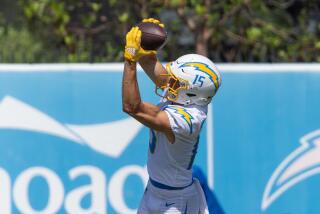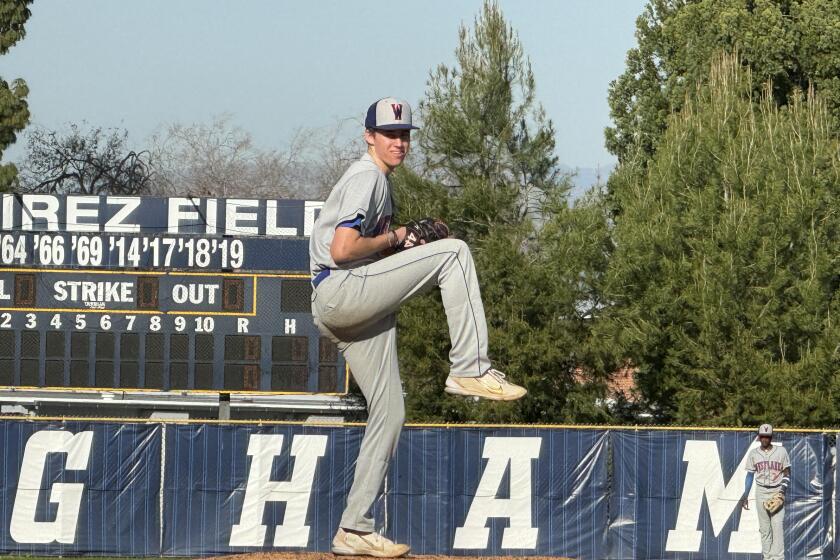Russian Arrival
- Share via
Take away the 20 letters that make up Vladimir Paniouchkine’s name, and there’s no way someone would identify him as Russian.
He’s captain of the Glendale High football team, earned straight-A’s on his last report card, receives college letters from Harvard and Yale and has no trace of a Russian accent.
Phil Gella is the starting strong safety at Los Angeles Loyola High, has a 4.2 grade-point average, scored 1,260 on the SAT, lives in Marina del Rey and loves surfing, skateboarding and rock climbing. He, too, is a Russian immigrant.
At Reseda High, Artem Shatokhin sticks out like a matryoshka doll on a coffee table. He is 6 feet 2, 290 pounds, with closely cut dark hair and a Russian accent straight out of a John le Carre novel.
He starts at defensive tackle, made the honor roll last year and wants to become a lawyer, cartoonist or professional football player.
All three arrived in America speaking no English, having no friends and wondering if their parents’ dream of “giving them a better life” could be fulfilled here.
Each encountered language barriers, moments of distrust and financial burdens. But in Southern California, where more than 140 languages are spoken, these three teenagers embraced parts of American life that allowed them to flourish in school and sports.
*
Paniouchkine was born on New Year’s Day 1985 in Riga, Latvia, a city of 900,000 on the Baltic Coast. Latvia was occupied by the Soviet Union in 1940 and declared its independence in 1991.
Paniouchkine was too young to understand the disappearance of his father when he was 5. Vladimir Paniouchkine Sr. was a major in the Soviet Army with a specialty in electronic engineering. He served as a special advisor to the defense ministry for the Republic of Yemen.
Wanting more opportunities for his family, he fled to Hamburg, Germany, leaving behind his wife and three sons.
“A KGB officer [was] in my house for two months because they were looking for me,” he said.
Several months later, his family was able to join him, and they lived in Hamburg for five years before moving to Twin Falls, Idaho, when Vladimir Jr. was 11.
So began Paniouchkine’s American experience.
“I was in awe to see all the material things Americans had,” he said. “I never had a bike and one day my parents went out and bought me and my brother a bike and we rode it for hours on one street. I was amazed at what choices there were.”
Conquering the language barrier was Paniouchkine’s first priority, and cartoons became his favorite way to learn words and phrases.
“I think TV is great,” he said. “When people say, ‘Don’t watch TV,’ I’m like, ‘My kids will watch TV,’ because I picked up so much from TV. I love cartoons. It taught me English.”
As his communication with classmates improved, so did his self confidence. But it was football that sent him on an odyssey of discovery and adventure.
“In my seventh-grade class, I used to be kind of a punk, a bully, because I didn’t know anybody,” he said. “They’d push me around and I’d bully them back. I really didn’t like this one kid playing handball. I slammed him into a wall and my P.E. teacher was like, ‘Go take that onto the field.’ I thought about it and went out for football.”
At Glendale High, he’s a 6-foot, 221-pound senior tailback and defensive end who bench presses 315 pounds and loves “the hitting, the touchdowns, the glory.”
“Instead of sending letters for college, I have letters being sent to me,” he said. “Harvard sent me some letters and my mom was jumping up and down clapping her hands.”
The family moved to Glendale two years ago to expand a trucking business that has grown to eight trucks. They live in a two-bedroom house.
Vladimir Sr. said he brought his family here to experience freedom.
“Nobody watching me, nobody behind me,” he said.
Now, if only his son could explain the rules of football to his father.
“I ask him, ‘Explain how it works,’ ” the elder Paniouchkine said. “I don’t understand completely. I understand touchdowns and move the chains.”
*
According to the 1990 census, there were 195,570 people of Russian ancestry living in Los Angeles County. Those numbers have more than doubled since the breakup of the former Soviet Union a decade ago.
Three years ago, Shatokhin left his home in Kharkov, Ukraine, a city of 2.5 million, drove with his parents to Kiev, boarded a plane to Paris, then another to New York and ended up in a one-bedroom apartment in Van Nuys.
In Ukraine, his father worked in a factory and his mother cleaned streets. They wanted their only child to gain educational opportunities in America. Shatokhin enrolled in Reseda High’s police academy magnet program, enabling him to study law enforcement.
Shatokhin said if he were still in Ukraine, he wouldn’t be learning how to put away criminals.
“If I would be there right now, I’m sure I’d be a gangster,” he said. “The only thing you get money from is the mafia.”
His father now drives a transportation van and his mother works for a technical institute. They expect their son to go to college, and football could be a way for him to earn a scholarship. He started on varsity as a sophomore last season.
“I don’t know how to say it, but it’s a very interesting game,” he said. “You have to be mentally and physically prepared.”
Shatokhin arrived proficient in math, having taken geometry as a seventh-grader in Ukraine, but his lack of English was an obstacle.
“In school, I didn’t understand anything,” he said. “I was trying to listen to the teacher and listen to people sitting next to me and listen to my friends at lunch. I was listening, listening, listening, then working on my pronunciations.”
Shatokhin’s grade-point average as a freshman was 3.8, but it dropped last school year because he admitted to getting lazy and missed classes after taking a trip to Ukraine to visit his grandmother.
Whether drawing, working on computers or hanging out with friends, Shatokhin feels comfortable and confident.
Football has given him added incentive.
“I want to play every day,” he said.
And he’s searching for size 15 in-line skates, which may be the strongest sign yet that Southern California has become his new home.
*
Elena Gella decided to start a new life with her only child. She concluded they no longer could stay in Vladivostok, a city of 700,000 near the Chinese border and home to the Russian naval fleet. There were too many bad memories of the death of her husband. An officer for a commercial shipping company, he died because of an accident when Phil was 7.
“It still hurts,” Elena said. “It was very difficult for us to live there emotionally.”
Three years later, they sold their apartment, packed their most valuable belongings, boarded a plane to Seoul, flew to Atlanta and ended up in Knoxville, Tenn. Soon they moved to Bakersfield, then Marina del Rey, where they live in a one-bedroom apartment. Elena is the sole provider, earning money by working with computers.
“The family we have is two people and a cat,” Gella said. “We both knew we would fight through it and survive. There was no turning back. We were very determined.”
Gella brought his favorite toys, a box of Legos and some stuffed animals. His mother packed a collection of books from “great Russian authors” such as Pushkin, Dostoevsky and Tolstoy that she hoped her son would read one day. It didn’t take long before Gella picked up American habits.
“In Russia, we had a little neighborhood with three or four big apartment buildings,” he said. “In the middle, all the kids played outside every day. In the U.S., very few kids play outside. They usually watch TV. I was Americanized. I started watching TV all the time and got into a little trouble with my mom. The good thing was in fourth grade, especially math, I was ahead of all the kids.”
Dealing with new classmates and a new country tested Gella’s faith in his mother’s decision to leave Russia.
“People were treating me unfairly,” he said. “They were calling me names. They really made me feel I was different.”
Football helped him fit in. He thrived on the physical sport even though he’s only 5 feet 8, 170 pounds. These days, his Loyola teammates tease those who feel the wrath of a Gella hit.
“Whenever I hurt somebody, they say, ‘Don’t worry about it, he’s the Russian,’ ” Gella said.
Gella still has fond memories of his days in Russia, from swimming in the freezing Pacific Ocean in October to crawling on the cannons in the Kremlin. He woke up in the middle of the night in June to watch the Russian soccer team in the World Cup.
“I root for all the Russian teams in the Olympics,” he said. “I’m proud to be a Russian person but also proud to be an American. You get the best of both worlds.”
Elena took a risk in leaving Russia for an uncertain future, but she has no regrets after seeing how her son has benefited.
She’s filled with pride, “not so much about his grades, but about his mind-set, who he is, what he is,” she said. “What makes me happy is that he’s safe, healthy and bright.”
Gella turned 18 on Saturday. Soon, he hopes to take the oath to become an American citizen.
“It’s going to be an important day because then I’m officially a Russian American,” he said.
Eric Sondheimer can be reached at eric.sondheimer@latimes.com
More to Read
Get our high school sports newsletter
Prep Rally is devoted to the SoCal high school sports experience, bringing you scores, stories and a behind-the-scenes look at what makes prep sports so popular.
You may occasionally receive promotional content from the Los Angeles Times.







